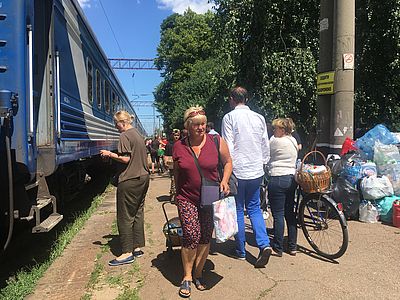(ANR-DFG) LimSpaces. Living with uncertainty. Strategies of adaptation and horizons of expectations in Ukraine and Moldova
Mobilities, Migrations, Reconfiguration of SpacesLead researcher: Sophie Lambroschini (CMB/CERCEC)
Funding agences: DFG-ANR
Project partners:
ZOiS – Centre for East European and International Studies (Berlin), Sabine von Löwis, https://www.zois-berlin.de/forschung/drittmittelprojekte/limspaces
UMR Géographie-cités, CNRS, Béatrice von Hirschhausen, https://geographie-cites.cnrs.fr/limspaces-vivre-lentre-deux/
Duration: 2021 – 2024
The LimSpaces project was born out of interdisciplinary synergies developed at the CMB between researchers and doctoral students during the years 2010-2019, within the working group "Territories, Continuities and Fractures in Central and Eastern Europe" and the project "Phantomgrenzen in Ostmitteleuropa" funded by the BMBF.
The project offers a novel reading of the societies of Ukraine and Moldova which seem to have settled into a lasting state of political and social instability at the very gates of the European Union. The originality of the project lies in its perspective. Instead of considering the societies of Moldova and Ukraine as peripheral versions of the European model, we investigate the microsocial effects on populations of their “in-between” state, caught between Western and Russian spheres of intervention. The project breaks with a widely held perception of these societies as cultural and historical "others." Instead, it analyzes them from an actor-centered, grounded and relational perspective.
The project pursues three objectives.
On an empirical level, it offers a comprehensive reading of these societies by looking at the everyday strategies people mobilize in situations “betwixt and between” characterized by a high degree of uncertainty. It seeks to shed light on the ways in which actors orient their choices to meet their basic needs, engage in business, get professional training, or project themselves into the future despite the instability of existing geopolitical allegiances and political fields.
On a theoretical level, the project mobilizes the concept of liminality in order to approach the French concept of "espace entre-deux" and the German one of "Zwischenraum". We will favor a dynamic approach to the concept because microsocial studies of such spaces, despite their lability, are often congealed in the present. This study will seek out the dynamics of creativity in human experiences and expectations as these are reshaped by the political transformations in the region.
On the academic level, the project helps to de-compartimentalize French and German approaches in the field of Central-Eastern European studies. It expands transnational networks with the prospect of building a broader European research project. As part of its mission, the project also provides scientific training to young researchers.
Research is based on a corpus of original qualitative data (interviews, ethnographic observations, cartographic studies). Three integrated partner-teams with a solid experience of such fieldwork carry out research in 12 locations which include the separatist territories of Transnistria in Moldova and in the border areas of the separatist self-proclaimed republics of Donetsk and Lugansk in Ukraine. The project explores the imaginaries and strategies that different types of actors (ordinary inhabitants, market traders, entrepreneurs, parents, students) employ to adapt to or escape the uncertainties of a liminal position.
We aim for a better understanding of Ukrainian and Moldovan societies. This is a necessary condition for the adaptation of European Neighborhood policy and migration management. More broadly, it supports a pluralistic reflection by Europe about itself, its inhabitants, its history and its territories.
Publications
Lambroschini S. (2022). "'Infrastructure Citizenship: An Expression of Ukrainian Sovereignty in Wartime'" Focus Ukraine. A blog of the Kennan Institute, 07/04/2022.
Lambroschini (2022). "Maintaining Critical Infrastructure as a Form of Resistance (Ukrainathon)" PONARS Eurasia (YouTube), 17/03/2022.
Lambroschini S. (2019). "Cross-frontline water supply in Donbas four years after the Minsk II ceasefire agreement: an outline of experiences and actors of cooperation" CivilMPlus, 28/09/2019.
Lambroschini (2019). "Winter War in Eastern Ukraine: The Everyday Drama of Water and Heating Infrastructure Collapse" Focus Ukraine. A blog of the Kennan Institute, 07/02/2019.
Media
2022. "As Russia fights Ukraine in Donbas, locals cooperate to keep the water flowing" QUARTZ, 04/05/2022.
2022. "Une semaine d'actualité: Sophie Lambroschini, journaliste, experte de la Russie et de l'Ukraine contemporaines" RFI, 01/04/2022.
2022. "L'Ukraine, une nation malmenée par l'histoire" TV5 Monde, Le journal international, 05/03/2022.
2022. "Ukraine : comment préserver les infrastructures ?" france culture, 28/02/2022.
2022. "Journal de 13h00 du week-end" france inter, 26/02/2022.
Events
10.03.2022 Discussion sur la guerre en Ukraine

- Principal Investigator(s):
- Sophie Lambroschini